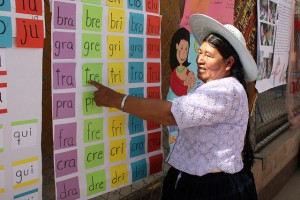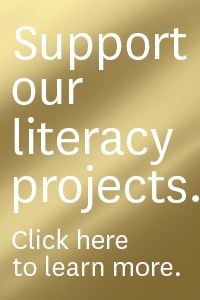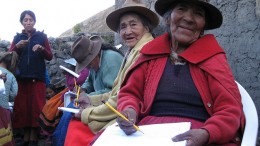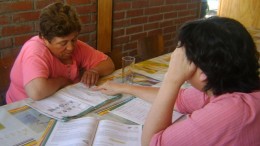International Literacy Day this Sunday celebrates that 84 per cent of the world can read and write, but has an eye on helping the 1.1 billion who can’t. Most of the world’s illiterate people are adult, with three-quarters found in just ten countries. However, every nation–developed ones included–has pockets of people who are totally or functionally illiterate.

A life-changing literacy programme in rural areas of Latin America is helping women stand up against domestic violence
United Bible Societies, a fellowship of Bible Societies in 146 countries, is at the coalface of combating illiteracy. Bible Societies work with local churches and organisations to run Bible-based literacy programmes. While learning to read, people also discover the Scriptures and gain valuable life skills that help them deal with issues like trauma, ethnic tensions and HIV/AIDS. Often this change affects not just the individuals in the literacy programmes, but extends to families and whole communities.
This society-changing impact is evident in five Latin American countries which have reaped from a Bible Society-run literacy project. The Read To Live programme in Bolivia, Peru, Equador, Chile and Panama is annually helping thousands of people, mostly women in isolated and rural areas. Apart from offering life-changing literacy skills, the programme in these male-dominated societies is helping to break the silence around one of the region’s biggest scourges: domestic violence. This affects seven out of ten women, especially in rural areas where illiteracy among women is particularly prevalent.
 Programme participants are taught basic literacy, and then move on to a series of reading comprehension booklets. These contain Bible verses and reflections about gender equality, mutual respect, children’s rights, forgiveness and communication. Using simple language for new readers, the materials help women have a better idea of their rights and their worth as individuals. Many say the programme is improving their family relationships, while others seek help instead of staying silent about the abuse they experience at home.
Programme participants are taught basic literacy, and then move on to a series of reading comprehension booklets. These contain Bible verses and reflections about gender equality, mutual respect, children’s rights, forgiveness and communication. Using simple language for new readers, the materials help women have a better idea of their rights and their worth as individuals. Many say the programme is improving their family relationships, while others seek help instead of staying silent about the abuse they experience at home.
“My husband and I are starting to build our marriage afresh,” says Janeth in Ecuador, who is participating in the programme with her husband. “He has stopped drinking since we studied the booklet which talked about alcoholism and other problems.”
“I used to feel so useless,” says Mauricia in Peru. “I couldn’t check my children’s homework or take on any meaningful roles in my community. My husband told me that if I could learn to read it would change everything. He was right! Now I am learning to read and I take my Bible with me when I herd the animals or go into the fields, so that I can practise all the time.”
In Chile, 54-year old Marta once suffered from very low self-esteem. Like more than 200,000 women in her country, she had only attended school for a few years. Last year, she shyly enrolled in the Read to Live programme. Despite criticism from her partner, Marta is today making slow but steady progress. She is delighted in being able to read Bible verses for herself, and is starting to gain self confidence.
“The word of God teaches that each individual-whether man or woman-has value and dignity,” says Pablo Gutierrez from the Peruvian Bible Society, who oversees the programme in all five countries. “The Read to Live Bible-based series is designed to get people thinking about things that lead to the violence quietly tearing families and communities apart.”
In Panama, previous government attempts to set up literacy programmes in the Ngobe Buglé community failed. The Bible Society however trained 15 Ngobe people as literacy teachers, and is currently running several well-attended literacy classes. “Combining literacy and a domestic violence prevention programme was the very best thing that the Bible Society could have done for this community,” says Bricelda Gonzalez from the Ministry of Social Development. “We hope that it will continue and expand so that these high levels of domestic violence become a thing of the past.”
Bible Society Australia, working with other Bible Societies, helps to sustain the Read To Live programme. Please click here if you would like to help break the vicious cycle of illiteracy, poverty and violence in Latin America.
To find out about literacy projects in other parts of the world, and how you can support them, please click here.
Email This Story
Why not send this to a friend?



